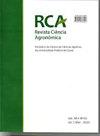Use of B-mode ultrasonography for sex determination and maturation monitoring in Prochilodus brevis (Steindachner 1875)
IF 0.7
4区 农林科学
Q3 AGRICULTURE, MULTIDISCIPLINARY
引用次数: 0
Abstract
- The Brazilian bocachico is a rheophilic fi sh from the northeast region of Brazil that holds great economic and scienti fi c interest. The absence of evident sexual dimorphism and the invasive character of sexing methods and evaluation of gonadal maturation are obstacles to its arti fi cial reproduction. In this scenario, ultrasonography emerges as a non-invasive method for sexing. The objectives of this study were to establish an ultrasound sexing method for Brazilian bocachico and select equations to estimate the gonadosomatic index (GSI), gonad weight (GW), and gonad volume (GV) of live bocachico. A total of 32 bocachico fi sh (18 females and 14 males) were analyzed ultrasonographically and morphologically. The association of morphometric and ultrasonographic parameters was investigated using Pearson Correlations. The following prediction equations were selected using multiple regression analysis: GSI = 16.22 × transvarea; GW = 30.3 × transvarea; and GV = 0.001260036 × pixels. A model capable of predicting the sex of the animals based on the ultrasonographic parameters was obtained using partial least-squares discriminant analysis with principal component analysis. The significance level adopted was P < 0.05. In conclusion, ultrasonography is a useful tool to perform sexing and evaluate the gonads during the breeding season, contributing to artificial reproduction in captivity.b型超声在短原蛾性别鉴定和成熟监测中的应用(Steindachner 1875)
巴西波卡西科是一种来自巴西东北部地区的嗜流变鱼类,具有巨大的经济和科学价值。缺乏明显的性别二态性和侵入性的性别方法和性腺成熟的评估是其人工繁殖的障碍。在这种情况下,超声检查成为一种非侵入性的性别鉴定方法。本研究的目的是建立巴西波卡西科的超声性别鉴定方法,并选择方程来估计活波卡西科的性腺指数(GSI)、性腺重量(GW)和性腺体积(GV)。对32条波卡西科鱼(雌鱼18条,雄鱼14条)进行了超声和形态学分析。利用Pearson相关性分析形态学参数与超声参数之间的关系。采用多元回归分析选择预测方程:GSI = 16.22 ×横截面积;GW = 30.3 ×横截面积;GV = 0.001260036 ×像素。采用偏最小二乘判别分析和主成分分析相结合的方法,建立了基于超声参数预测动物性别的模型。采用的显著性水平为P < 0.05。综上所述,在繁殖季节,超声检查是一种有用的工具来进行性别鉴定和评估性腺,有助于人工繁殖。
本文章由计算机程序翻译,如有差异,请以英文原文为准。
求助全文
约1分钟内获得全文
求助全文
来源期刊

Revista Ciencia Agronomica
Agricultural and Biological Sciences-Horticulture
CiteScore
2.00
自引率
0.00%
发文量
41
审稿时长
4-8 weeks
期刊介绍:
To publish technical-scientific articles and study cases (original projects) that are not submitted to other journals, involving new researches and technologies in fields related to Agrarian Sciences. Articles concerning routine analysis, preliminary studies, technical notes and those which merely report laboratorial analysis employing traditional methodology will not be accepted for publication. The Journal of Agronomical Science also has the mission to promote the exchange of experience in the referred fields.
 求助内容:
求助内容: 应助结果提醒方式:
应助结果提醒方式:


